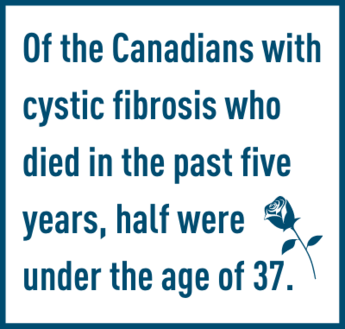CANADIAN DATA CONTRIBUTE TO GLOBAL UNDERSTANDING OF COVID-19’S IMPACT ON PEOPLE WITH CYSTIC FIBROSIS
TORONTO, August 11, 2022 – Cystic Fibrosis Canada, member of the CF Registry Global Collaboration, has continued its work to contribute to an important global understanding of the impact of COVID-19 on people with cystic fibrosis (CF), via the Canadian Cystic Fibrosis Registry.
A paper entitled “Factors associated with clinical progression to severe COVID-19 in people with cystic fibrosis: A global observational study”, published in the Journal of Cystic Fibrosis in July 2022 showed that there are several clinical and demographic risk factors in people with CF associated with poor outcomes of SARS-CoV-2, the virus that causes COVID-19. Dr. Anne Stephenson, Medical Director of Cystic Fibrosis Canada’s Canadian Cystic Fibrosis Registry and CF physician at St. Michael’s Hospital was senior author and Stephanie Cheng, Director of the Canadian CF Registry at Cystic Fibrosis Canada co-authored the paper.
The Canadian Cystic Fibrosis Registry monitors important clinical trends in the Canadian CF population. The CF Registry is used both by CF clinicians and researchers to improve their knowledge of disease patterns and care of patients with cystic fibrosis. As it includes data on nearly all Canadians with cystic fibrosis, it plays an invaluable role in helping to improve the quality and length of life of people with cystic fibrosis.
“This COVID-19 study demonstrates how the data collected within the Canadian CF Registry can contribute to an international body of research and help us respond to emerging health care issues,” said Ms. Cheng. “Its wealth of information can be analyzed and put to work to improve outcomes for people who live with cystic fibrosis not only in Canada, but around the world.”
The global observational study followed 1,452 people across 22 countries who live with cystic fibrosis and who had a confirmed SARS-CoV-2 infection between February 1 and December 13, 2020, prior to the broad availability COVID-19 vaccines. It analyzed how many of these people were hospitalized and the level of intervention they required in terms of oxygen or intensive care. In an effort to determine which factors were associated with more severe outcomes, the study analyzed people’s outcomes according to some cystic fibrosis-related characteristics, such as whether they were taking a highly-effective modulator treatment, had previously had a lung transplant, had CF-related diabetes and were under or overweight. It also looked at age and race.
The study concluded that “there is a protective effect from the use of CFTR modulator therapy and that people with CF from an ethnic minority are at more risk of severe infection with SARS-CoV-2.” Read the full text of the paper here.
This study builds on previously published international research on cystic fibrosis and COVID-19, that Cystic Fibrosis Canada has contributed to through its CF Registry database. Following-up on this work, the participation in the CF Registry Global Collaboration has expanded around the world, and the group is currently studying the mid-to-long term impacts on clinical outcomes following SARS-CoV-2 infection.
About cystic fibrosis
Cystic fibrosis is the most common fatal genetic disease affecting 4,332 Canadian children and young adults. There is no cure. Of the Canadians with cystic fibrosis who died in the past five years, half were under the age of 37. Cystic fibrosis is a progressive, degenerative multi-system disease that affects mainly the lungs and digestive system. In the lungs, where the effects are most devastating, a build-up of thick mucus causes severe respiratory problems. Mucus and protein also build up in the digestive tract, making it difficult to digest and absorb nutrients from food. In addition to the physical effects of the disease, mental health concerns are emerging; anxiety and depression are common among this population. Double lung transplants are the final option for patients with end-stage disease; most fatalities of people with CF are due to lung disease.
About Cystic Fibrosis Canada
Cystic Fibrosis Canada has dramatically changed the cystic fibrosis story. We have advanced research and care that has more than doubled life expectancy. Since being founded by parents in 1960, Cystic Fibrosis Canada has grown into a leading organization with a central role engaging people living with cystic fibrosis, parents and caregivers, volunteers, researchers and healthcare professionals, government and donors. We work together to change lives for the 4,332 Canadian children and adults living with cystic fibrosis through treatments, research, information and support. Despite our remarkable progress together, we are not yet done. Not when half of the Canadians with cystic fibrosis who died in the past three years were under the age of 34. We will keep pushing, keep going further until all people with cystic fibrosis can and do experience everything life has to offer —and enjoy everything life has to offer. Learn more at cysticfibrosis.ca.
-30-
For more information:
Magdelena Oskam, Coordinator, Marketing and Communications
Tel: (226)?899-1363
Email: moskam@cysticfibrosis.ca



.png)
